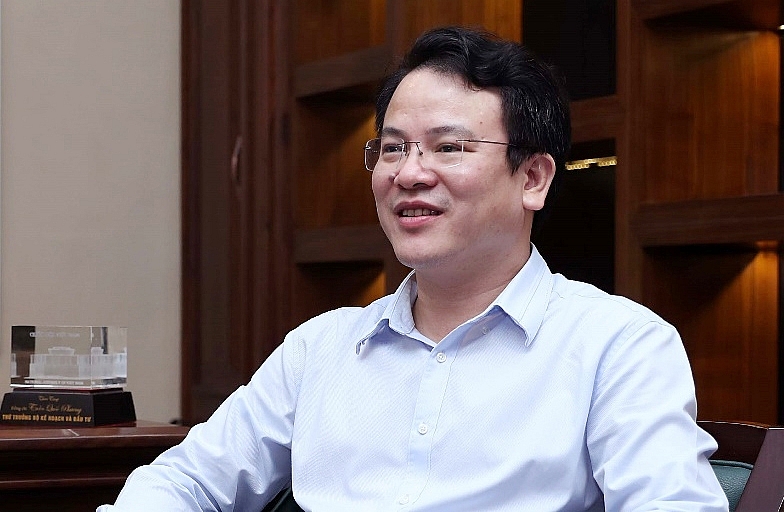Strong strategies critical to achieving national SDGs
 |
| Tran Quoc Phuong - Deputy Minister of Planning and Investment. Photo: mpi.gov.vn |
To foster economic growth and environmental protection, some business models related to the circular economy are being promoted and evolved strongly. How do you assess the role of this in the current context?
The normal economy has put a lot of pressure onto the environment, because natural resources are going to be exhausted and environmental pollution becomes serious. Most countries over the world are creating better solutions towards green and clean economy, and sustainable development. Global economic growth has obtained some great achievements, in parallel with the deficit of natural resources and the increase of environmental pollution. In order to fix these troubles, countries are paying attention to developing the circular economy, with all activities based on recycled materials to mitigate negative impacts on environment, save the ecosystem, and protect people’s health.
Thanks to use the of recycled materials and resources, the circular economy enables natural resources to be saved, environments to be protected, and economic growth and social benefits to be strengthened. It enables waste to become an input for other production cycles, while reducing greenhouse gas emissions and responding to climate change, as well as cutting costs for businesses. This creates trends for all countries, especially developing ones with fewer natural resources. Vietnam has achieved some good outcomes in implementing sustainable development goals (SDGs). However, we are facing a rise of generated waste, while the resource of raw materials and fossil raw materials is going to be exhausted.
Additionally, many domestic manufacturers still use outdated technology for small-scaled production lines, and do not pay enough attention to recycling. So the circular economy will contribute to sustainable production and consumption, remove the shortcomings of traditional economy.
While the world has yet to control COVID-19, is sustainable development the only way forward to mitigate impacts of other diseases and disasters in the future?
There are hundreds of thousands of people infected with the coronavirus worldwide on a daily basis, and so far around 1.5 million people have lost their lives. The virus has been impacting economies worldwide, and will continue to do so until a vaccine is found and the pandemic is fully under control. This creates a lot of barriers for Vietnam to implement socioeconomic development plans and SDGs.
Realising these troubles, sustainable development is not only a goal, but also integrated into every plan for economic recovery and development to fend off future external shocks.
In September, the government issued Resolution No.136/NQ-CP on sustainable development through 2030, detailing Vietnam’s 17 SDGs. Then in March, the Ministry of Planning and Investment issued Decision No.468/QD-BKHDT guiding the monitoring and evaluation of SDG implementation through 2030, following Decision No.2158/QD-BKHDT from December last year. That offers guidance on SDG implementation under the next two socioeconomic development plans (2021-2025 and 2026-2030).
Moreover, 17 of 22 ministries and agencies and 51 out of 63 cities and provinces have already issued action plans to implement the 2030 Agenda for Sustainable Development.
Vietnam’s 2021-2030 Socioeconomic Development Strategy is being formulated. What are the concepts in building the strategy and the integration of sustainable development?
Fast and sustainable development in integration with environmental protection, the collaboration between reaching economic outcomes and the welfare of society are the most important targets in building the socioeconomic development strategy for this decade. The strategy will set people at the centre of the development. Every Vietnamese will contribute, they will benefit, and no-one will be left behind.
Of this, fast and sustainable development will be based on science-technology, innovation, and digital transformation. Mindsets and activities should be more creative to seize opportunities of Industry 4.0 and international integration to restructure the economy, promote the digital economy, and improve economic productivity, quality, performance, and competitiveness. The strategy will develop the economy in harmony with culture, society, environmental protection, and adapting to climate change, as well as pay more attention to policy beneficiaries, the poor and vulnerable, and ethnic minorities.
Reforming and improving the quality of socialist-oriented market economy institutions, well-performing integration, and legal implementation are priority conditions for the country’s development. Developing all economic sectors and all business forms, including the private sector, are the major driving force of the economy. The strategy will focus on arousing the aspiration and resilience of national development and setting humans at the centre point, as the object, resource, and target of the development – considering Vietnamese cultural values and people as the foundation and internal strength for sustainable development.
The economy should be developed based on mastering technology and proactively integrating, diversifying markets, improving the economy’s adaptive capacity. The strategy’s overall goal is enabling Vietnam to become a developing country with modern industry, high average income, modern and effective governance, and a dynamic and sustainable economy by 2030, in collaboration with enhancing lives and implementing some more SDGs.
What the stars mean:
★ Poor ★ ★ Promising ★★★ Good ★★★★ Very good ★★★★★ Exceptional
Related Contents
Latest News
More News
- Citi economists project robust Vietnam economic growth in 2026 (February 14, 2026 | 18:00)
- Sustaining high growth must be balanced in stable manner (February 14, 2026 | 09:00)
- From 5G to 6G: how AI is shaping Vietnam’s path to digital leadership (February 13, 2026 | 10:59)
- Cooperation must align with Vietnam’s long-term ambitions (February 13, 2026 | 09:00)
- Need-to-know aspects ahead of AI law (February 13, 2026 | 08:00)
- Legalities to early operations for Vietnam’s IFC (February 11, 2026 | 12:17)
- Foreign-language trademarks gain traction in Vietnam (February 06, 2026 | 09:26)
- Offshore structuring and the Singapore holding route (February 02, 2026 | 10:39)
- Vietnam enters new development era: Russian scholar (January 25, 2026 | 10:08)
- 14th National Party Congress marks new era, expands Vietnam’s global role: Australian scholar (January 25, 2026 | 09:54)

 Tag:
Tag:



















 Mobile Version
Mobile Version